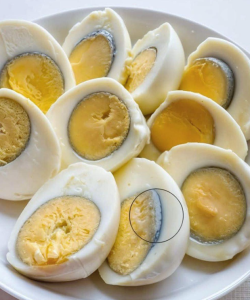The Mysterious Kitchen Phenomenon That Has Puzzled Home Cooks for Generations
Every home cook has had a moment in the kitchen that defies logic. The cake that collapses despite following the recipe to the letter. The sauce that curdles at the last second. The perfectly proofed bread dough that mysteriously refuses to rise in the oven. But among all these culinary quirks, there’s one phenomenon that has puzzled, frustrated, and intrigued generations of cooks around the world: the case of the vanishing seasoning.
The Great Flavor Fade
Here’s the mystery: You carefully season a dish. Salt, pepper, spices — maybe even a pinch of something exotic. You taste it and it’s perfect. Balanced, bold, just the way you want it. But then, something strange happens. You let the dish simmer for a while, or maybe you reheat it later that evening — and suddenly, it tastes bland. The flavor is gone. Where did it go?
This strange and maddening disappearance of flavor has earned nicknames among chefs and home cooks alike — “The Flavor Fade,” “The Disappearing Salt Trick,” or simply “Kitchen Black Magic.” And for decades, cooks have swapped theories, superstitions, and hacks to avoid it. But even now, in the age of molecular gastronomy and AI-powered recipes, the vanishing seasoning phenomenon still has no single, clear explanation.
The Science — Or Lack Thereof
At first glance, it seems like a scientific puzzle. Shouldn’t flavor become more concentrated as food simmers or rests? Isn’t that why leftovers often taste better the next day? The answer is: yes — sometimes. But not always.
Here’s what scientists and food chemists think might be happening:
1. Taste Bud Fatigue
Our palates adapt quickly to salt and strong spices. When you first season a soup or stew, your taste buds register every note. But after simmering for hours, the same dish might taste weaker because your taste buds have adjusted to the flavor. It’s not that the seasoning has vanished — your mouth just stops noticing it as intensely.
2. Absorption and Dispersal
In slow-cooked dishes, seasonings often get absorbed into ingredients like potatoes, rice, or meat. What started as a bold broth becomes duller because the salt and spices are now buried inside the food, not floating freely in the liquid. Similarly, spices may disperse unevenly, so a once-balanced flavor can become muted if ingredients absorb too much or settle unevenly.
3. Chemical Breakdown
Certain flavor compounds — especially delicate ones like garlic, onion, fresh herbs, or ground spices — break down over time when exposed to heat. A freshly spiced curry may lose its punch after prolonged cooking because the essential oils that carry the flavor literally evaporate or degrade.
4. Acidity and pH Changes
Tomato-based sauces and vinegar-heavy recipes often alter the pH of a dish, which can change how we perceive saltiness and spice. In highly acidic dishes, salt becomes less noticeable. That’s why many Italian grandmothers recommend adjusting seasoning after the sauce has simmered — not before.
Generational Wisdom — and Folklore
Long before science tried to explain it, grandmothers around the world had their own theories about this mysterious kitchen phenomenon. Some believed the problem was timing — “Never salt beans too early, or they’ll go tough and bland,” warned one old Spanish saying. Others insisted that wooden spoons steal flavor, and some cultures believed that a metal pot on high heat could “burn” the seasoning right out.
Old-school solutions included:
-
Finishing salts: Adding a fresh sprinkle of salt just before serving to “wake up” the flavors.
-
Staggered seasoning: Adding spices in layers — some at the start, some halfway, and some at the very end — to keep flavors vivid.
-
Tasting cold: Some cooks taste test a small spoonful of food after it cools, to judge its final flavor more accurately.
Despite a lack of formal training, these traditional practices often mirrored what modern food science later confirmed.
The Reheat Mystery
The problem doesn’t end with cooking — it often intensifies when food is reheated. A flavorful meal can taste bland and lifeless the next day, especially if it’s microwaved. Here’s why:
-
Microwaves heat unevenly, often leaving pockets of food under-seasoned.
-
Oils and fats, which carry flavor, can separate or congeal during cooling and reheating.
-
Spices continue to break down even in the fridge, especially in spicy dishes, where the heat of chili peppers seems to vanish.
Some experts recommend re-seasoning leftovers, especially soups, stews, or rice dishes, before serving. A dash of salt, lemon juice, or a sprinkle of fresh herbs can often revive a tired dish.
What Chefs Say
Even professional chefs wrestle with this mystery. Chef David Chang once described certain dishes as having “dead zones” — areas where the seasoning just disappears no matter how carefully you stir. Chef Samin Nosrat, author of Salt, Fat, Acid, Heat, emphasizes that salt doesn’t just make things salty — it makes everything taste more like itself, but only if it’s used properly throughout the cooking process.
“People think seasoning once is enough,” Nosrat said in an interview. “But really, seasoning is something you do again and again — as the food changes, so must the flavor.”
Tips to Beat the Vanishing Flavor
If you’ve ever struggled with the disappearing seasoning mystery, you’re not alone — but here are a few proven tips to help solve it in your own kitchen:
-
Season in stages – Add some seasoning at the start, but reserve a portion for the end when flavors need a lift.
-
Balance the five tastes – If something tastes flat, it might need acid (lemon, vinegar), sweetness (a pinch of sugar), or umami (soy sauce, parmesan) — not just salt.
-
Use fresh herbs last – Cooking herbs like basil or cilantro for too long dulls their flavor.
-
Watch your heat – High heat for long periods can destroy spices and evaporate aromatic oils.
-
Rest and retaste – Let food cool slightly before final tasting — the real flavor often emerges as it settles.
Still a Mystery… But a Delicious One
In the end, the mystery of the disappearing seasoning may never have a single answer. It’s a mix of science, psychology, chemistry, and yes — a little bit of kitchen magic. Every cook experiences it, and every cook learns to adapt, experiment, and taste with instinct as much as knowledge.
It’s a reminder that cooking is not just about formulas — it’s about feeling, observation, and learning from experience. The stove may provide the heat, but the real power lies in the hands — and tongue — of the cook.
So the next time your stew tastes mysteriously flat, don’t despair. You’re part of a centuries-old tradition of cooks facing the same question: Where did the flavor go? And with a little wisdom — and a pinch more salt — you’ll find it again.

